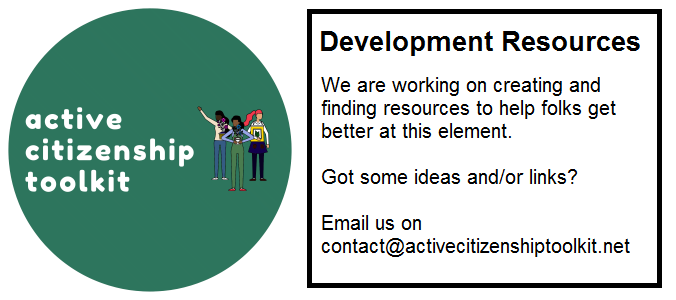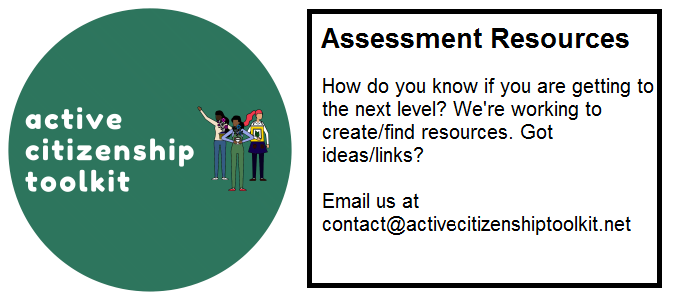Element Descriptor
Those who like the status quo just how it is are always keen to draw in (some) critics. It splits the opposition, confuses the general public and provides a nice veneer of “listening”. Understanding the mechanisms by which co-optation is achieved is never wasted effort (even though most activism, even the ‘effective’ stuff, is).
Level descriptors
| Novice | Practitioner | Expert | Ninja |
|---|---|---|---|
| You understand the style and basic attractiveness of cooptation (invite to sit on panel, taking money with explicit ties | You understand the particular favoured mechanisms of organisations likely to want to neutralise you (be they states or corporates) and what the personal and movement organization consequences of supping with various devils with various length spoons are.. | You have a comprehensive knowledge of past, present and emerging styles of co-optation/neutralisation, and how they get deployed in different ways, and what can be done to minimise their effectiveness, while building the capacity of civil society organisations to do their own analysing and resisting. | You are able undercut if not neutralise the latest secret cognitive maneuvers in the dark… MediaLens have you on speed dial, and Chomsky endorses your latest book. |
Element Overview Essay
This is a draft. If something doesn’t make sense, or you see typos, or if you have further ideas, please email us on contact@activecitizenshiptoolkit.net
The reason that social movement organisations are so poor at resisting and monkey wrenching co optation is that well, some of them don’t even see it or regard it as just the way things are And that you can only change the system from within. And you can only have influence if you have access. And that, well, these are the people I went to school with and you’re being too cynical and they really genuinely want to engage. And we’ve got to give it a try, as if no one else has tried before. So there is an ignorance of the history of cooptation and invitations to sit on panels and advisory groups, and so forth.
And there can be an arrogant assumption that if there were other attempts, these failed because they weren’t the right people. Now that you and your organisation on the panel all will be fine.
Further, people are desperate to have a sense of momentum and influence, And they have an organisational need. You might need a grin and grip photo to put in the annual report to show other middle class guilty, smaller liberals that it’s worth renewing the direct debit for another year. There are also just some naked careerists who have no real interest in grassroots democracy but know that if they speak the language for a year or two, they’ll be able to leverage that into a post with an NGO or a think tank and then leverage that and leverage that. That used to be the way it worked. I think things have now gotten to such an advanced state of collapse, that that is becoming harder to sustain as a viable career strategy overtly or covertly, but I could be wrong.
So the consequences of not understanding state and corporate cooptation. Either you’re just completely going to be suckered by it and fall for it and be useless. And it will help deradicalise and de-fang, your civil society effort to get sensible policy and sensible policy information you’ll be drawn into an endless quagmire of meetings and consultations. meetings held at short notice with agendas decided by the council or the government, where all the time and space is taken up, and you are sworn to secrecy. So you can’t discuss what has been said. And by that you will be perceived by people outside the process as having become the part of the machine.The solutions involve relentlessly explaining what cooptation is, how it works, and why it is such an effective tool in the hands of the lords and masters and how there needs to be a real unity against it. Now, of course, there are times when for reasons of personality or policy vulnerability or whatever, that a council doesn’t do consultation and cooptation which is entertaining.
Development Resources

Assessment Resources

